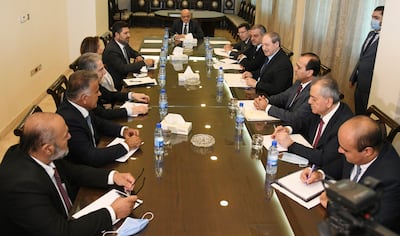Lebanese ministers were in Damascus on Saturday in their highest-level Syrian visit for 10 years to discuss a proposal aimed at easing Lebanon's energy crisis.
The delegation, led by Zeina Akar, deputy prime minister in Lebanon’s caretaker government, was in Damascus to discuss a plan to use Egyptian gas to generate electricity at plants in Jordan. The electricity would then be transported to Lebanon through the Syrian grid.
Analysts say the move could open the door to Syria’s reintegration into the international community.
The delegation, which also included Maj Gen Abbas Ibrahim, the head of Lebanon's intelligence agency, as well as the caretaker ministers for energy and finance Raymond Ghajar and Ghazi Wazni, was received by Syria’s Foreign Minister, Faisal Mekdad.
The plan, which has US backing, faces a series of logistical challenges – not least American sanctions on Syria, which any imports risk breaking.
However, a delegation of US politicians on a visit to Lebanon last week suggested there was a willingness to overcome the hurdle of sanctions to prevent Beirut from importing fuel from Iran.
This public endorsement of the idea indicates that the US might not automatically block a deal that involved Syria.

US Senator Chris Murphy said this was an attempt to "find a way to get this done that would not involve any US sanctions. We are working hard to try to find a solution to the fuel crisis”.
'No magic solution'
Speaking to The National, one senior European diplomat in Beirut was sceptical about the plan. “The US will pay a political price to waive financial sanctions on Syria to make it possible,” they said.
Marc Ayoub, a researcher at the Issam Fares Institute for Public Policy and International Affairs at the American University of Beirut, said that although the potential energy transfer from Syria’s grid was a positive step, it would not solve Lebanon’s chronic power shortages.
“The maximum capacity [of transfers from the Syrian grid] is around 270 megawatts. It’s not a huge amount – this cannot close the gap we have in terms of energy demand.
“There is no magic solution, but this is positive. Why did this happen now, and not two years ago?”
Lebanese politicians have largely stayed away from Syria in an official capacity since the war there began a decade ago, but the apparent green light from the US allowed ministers to make the trip without fear of reprisals from Washington.
Lebanon has been plagued by electricity shortages in recent months, with the central bank refusing to release dollars to pay for the import of new fuel.
Tankers full of fuel can be regularly be seen anchored off the coast of Beirut, as much of the city lies in darkness.
The result has been chronic power cuts and long lines at petrol stations.
Saturday's Damascus visit came as Lebanon supposedly awaited the arrival of a shipment of fuel from Iran, brokered by Hezbollah chief Hassan Nasrallah, in a bid to ease the energy shortages.
The prospect of Iranian oil arriving on tankers pushed the US into giving its tacit backing to the Damascus trip.
Yet Tanker Trackers, an independent oil export tracking site, denied that the fuel was bound for Lebanon and insisted that it believed the shipments were “strictly for Syria’s use”.
Nadim Shehadi, Executive Director of the Lebanese American University in New York, said the Damascus meeting was a massive coup for the regime of President Bashar Al Assad.
“The Syrian regime's allies here [in Beirut] have always wanted to go to Damascus, but they were worried about sanctions – now they can. The Americans can’t sanction them for something they themselves have supported."
"They [US] should have ignored the boats; they don’t have to react to a press release from Tehran. She should react to the boat actually coming to Beirut," he said.
"No Lebanese minister would have allowed the Lebanese boat to dock here with the threat of sanctions."







